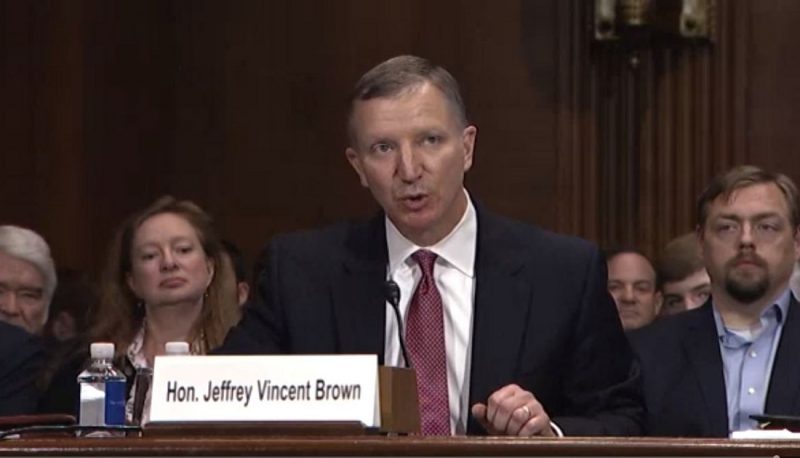On March 11, President Trump nominated Justice Jeffrey Vincent “Jeff” Brown to be a federal judge in the Southern District of Texas. The Senate Judiciary Committee has scheduled Brown’s hearing for April 10. People For the American Way wrote to committee members to express our opposition to the Brown nomination. You can download our letter here.
Dear Chairman Graham, Ranking Member Feinstein, and Committee Members:
On behalf of our 1.5 million supporters nationwide, People For the American Way strongly opposes the nomination of Justice Jeffrey Vincent “Jeff” Brown to be a federal judge in the Southern District of Texas. Brown’s record as a state judge shows that he places political goals over the rule of law and the welfare of innocent people, and he has shown disrespect for the federal judiciary in a manner unbefitting a judge on any court.
Brown has been on the Texas Supreme Court since 2013. In 2017, he used his position on the bench to harm married couples of the same sex, in flagrant violation of unambiguous Supreme Court precedent requiring states to give equal “rights, benefits, and responsibilities” to all married couples, regardless of the sex of the spouses.
In Pidgeon v. Turner,i Brown and his colleagues (including now-circuit court judge Don Willett) addressed the constitutionality of Houston’s law giving city employees spousal benefits only for opposite-sex spouses. Overruling a lower court’s opinion in favor of the city, they ruled that while Obergefell required states to license marriages equally, it didn’t address equality of benefits. To justify their bizarre conclusion, Brown, Willett, and the others posited that this was just one among many questions the marriage equality ruling didn’t address:
Already, the [U.S.] Supreme Court has taken one opportunity to address Obergefell’s impact on an issue it did not address in Obergefell, and there will undoubtedly be others. See Pavan [v. Smith and the then-pending Masterpiece Cakeshop case].
Pavan v. Smith was a summary reversal of an Arkansas court’s ruling upholding discriminatory rules for listing married parents on a birth certificate if they are of the same sex.ii No oral arguments were needed because Obergefell was unambiguous. But Brown and his colleagues used the U.S. Supreme Court’s forceful repudiation of another court’s defiance of the rule of law as precedent for more defiance.
And Masterpiece Cakeshop addressed legal issues not at all related to government recognition of marriages. It involved businesses claiming a First Amendment right not to comply with anti-discrimination laws protecting LGBT people from discrimination.
It is bad enough when political activists conflate state recognition of marriage with a private business’s compliance with anti-discrimination laws. But a state supreme court justice who made such an enormous legal error and could not tell the difference between the two legal concepts does not have the judgment to be a federal judge. And if Brown did recognize the difference, then his decision to join the 2017 Texas marriage benefits opinion indicates a dangerous willingness to subordinate the rule of law to his personal feelings.iii
Brown also has a disturbing view of the law in the area of abortion rights, apparently seeing his court’s job as burdening that right. When the state legislature made the judicial bypass process for minors more restrictive, the Texas Supreme Court unanimously adopted procedural rules that went even further than lawmakers had gone, making the process less likely to allow minors to exercise their constitutional rights.iv
Two weeks later, when speaking to the NE Tarrant Tea Party organization about the constitutional requirements for a judicial bypass, he made his opposition to Roe v. Wade and its progeny clear:
Now you may be wondering where any of those words are appear in the United States Constitution. They don’t. But the Court at that time, and to a large extent still today, finds things in the Constitution that aren’t there.v
One change that was particularly welcomed by anti-choice activists was the new law’s elimination of a requirement that a bypass be considered granted if a judge failed to rule within the required time limit. The new state legislation was silent about this issue, but Brown and his colleagues took it upon themselves to address it: the petition would be considered denied and the woman deprived of her constitutional rights.
Later in the same speech, he quoted praise for his handiwork from the legislative director of Texas Right to Life:
Ending the automatic granting of bypass petitions was a top priority for Texas Right to Life, and because of our advocacy, the Texas legislature ended the ridiculous practice. However, we appreciate the Supreme Court of Texas clarifying that a petition is automatically denied if the judge fails to rule within five days of the hearing. … This is a common sense policy that matches virtually every other judicial process in Texas, and will stop the abortion industry from manipulating the court system, to usher minors to elective abortions without any parental involvement.vi
Brown used this language to credential himself before his audience. He was proud of it. This would not inspire confidence from a woman seeking to vindicate her right to abortion in his courtroom.
Justice Brown’s record is not that of a principled constitutionalist. He should not be confirmed to a lifetime appointment as a United States federal judge.
Sincerely,
Marge Baker
Executive Vice President for Policy and Program

